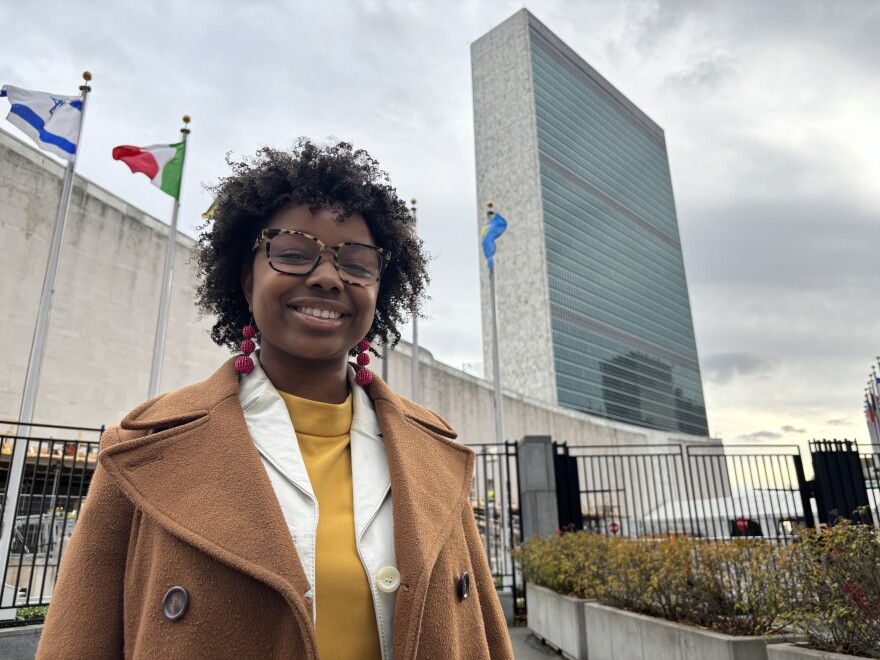BETHLEHEM, Pa. — Rhema Hooper has been sharing her time and passion to make the world a better place long before Monday afternoon.
But make no mistake: Hooper, a Lehigh University sophomore, having been invited among other college students to deliver a speech at the United Nations on Human Rights Day regarding the endangerment of children in war zones and being forced to work in cobalt mines in the Congo is among her proudest moments.
“I’m extremely excited to have had this platform at the U.N.,” Hooper, 18, said.
“I’ve been praying and communicating with the people closest to me about this opportunity to address issues at the U.N., like the dangers of children in cobalt mining and child labor everywhere.”
The 2 ½-hour conference, "Making the Universal Declaration of Human Rights a Reality: The Role of Higher Education,” was broadcast on UN Web TV.
It underscored the critical imperative of human rights in the work of the United Nations, and highlighted what universities and colleges worldwide are doing and can do to promote and implement the Universal Declaration of Human Rights.
“I’ve been praying and communicating with the people closest to me about this opportunity to address issues at the UN like the dangers of children in cobalt mining and child labor everywhere.”Rhema Hooper, sophomore, Lehigh University
The UDHR is an international document celebrating its 75th anniversary. Adopted in 1948 by the U.N. General Assembly, it enshrines the rights and freedoms of all humans.
Hooper was among four university students nationally and four human rights academics who addressed the body during the second of two 75-minute panel discussions titled “Aligning student actions and teaching and research methodologies, outputs and strategies with pressing human rights challenges.”
“From 2016 to 2020, there was an increase of 8.4 million children working in child labor,” Hooper said during her five-minute speech.
“And in 2020, the International Labour Organization reported that 160 million children — nearly 1 in 10 globally — participate in child labor, of which 79 million participate in hazardous work.”
Children 24 hours a day in tunnels
Hooper said that artisanal (non-mechanical) and small-scale mining relies on workers using hand tools to collect resources such as cobalt, gold and tin.
It's especially dangerous and heavily reliant upon child workers, she said.
“The dangers and child labor concerns demonstrate not only a violation to Article 4 of the Universal Declaration of Human Rights,” Hooper said, “but are counter to numerous sustainable development goals such as good health, affordable and clean energy, decent work and economic growth and reduced inequalities.”
“With all of this progress in protecting children worldwide, what will we now do to end their role in artisanal and small-scale mining?”Lehigh University student Rhema Hooper
The Democratic Republic of the Congo sits atop an estimated 3.4 million metric tons of cobalt, almost half the world’s known supply.
Cobalt is widely used in the production of goods including batteries for smartphones, computers and electric vehicles, for which demand is growing.
The DRC is a global leader in cobalt production and accounts for more than 50% of the world’s cobalt reserves.
Cobalt is extremely toxic to touch and breathe. Children routinely work in the mines, often under hazardous conditions.
Amnesty International spoke to a 14-year-old orphan in the Congo who said he would spend 24 hours a day in the cobalt tunnels, carrying heavy loads, for $1 to $2 per day.
UNICEF reported that 40,000 children work in mines across the Southern Congo.
“With all of this progress in protecting children worldwide, what will we now do to end their role in artisanal and small-scale mining?” Hooper said.
“I urge the global academic community to emphasize research investigating possible solutions for more efficient mining practices and recycling of mined materials.
“And just as importantly, I encourage universities to include more curriculum regarding hazardous conditions and child labor in artisanal and small-scale mining.”
'Education, human rights go hand in hand'
Penny M. Venetis, director of the International Human Rights Clinic and Distinguished Clinical Professor of Law at Rutgers University, said: “Education and human rights go hand in hand.”
Following the speeches and discussions, a question-and-answer session was held with students at the event, as well as with members of non-governmental organizations and diplomats.
“When one of my professors reached out to me about having an opportunity to speak at the U.N. about how the UDHR has influenced my research at Lehigh, I jumped at it."Lehigh University student Rhema Hooper
Hooper’s participation was made possible by the Lehigh University/United Nations Partnership that provides opportunities for all Lehigh students, faculty and staff to gain skills needed to become successful global changemakers by engaging with the United Nations in meaningful ways.
Each year, more than 1,000 Lehigh faculty, staff and students attend U.N. conferences, high-level briefings and private meetings with ambassadors and other U.N. officials in New York City and on campus.
“When one of my professors reached out to me about having an opportunity to speak at the U.N. about how the UDHR has influenced my research at Lehigh, I jumped at it,” Hooper said.
Hooper is pursuing a degree in Community and Global Health and a minor in molecular biology. She said she intends to become a practicing physician in Middle Eastern refugee camps.
Hooper credits the influence of her parents for her interest in pursuing a career in helping mankind.
'It was about helping'
As a child growing up in Southern California, she watched as her mother and father would spend two months in Japan in the summer on gospel missions.
“They would teach the Japanese people about Black gospel music,” Hooper said. “And by the end of the summer, about 500 Japanese people would be in a choir singing at a concert.
“I’m a Christian. My most important goal is to see the love of God in people. Having that experience at age 7 showed me how to have a global lens.”Lehigh University student Rhema Hooper
“When I was 7, our whole family went to Japan. I remember doing workshops with people there. We’d do vocal exercises and teach them to sing and prepare them for songs for the showcase concern. It was about helping.”
Among Hooper’s enduring memories in Japan was visiting children.
“We went to orphanages, elementary schools, middle and high schools, and special needs facilities,” she said. “We went to help.
“I’m a Christian. My most important goal is to see the love of God in people. Having that experience at age 7 showed me how to have a global lens.”
The name Rhema is derived from Greek and is defined as “spoken word.”
In the case of this empathetic and committed Lehigh University student, her words don’t travel alone.
They walk in lockstep with deeds.


